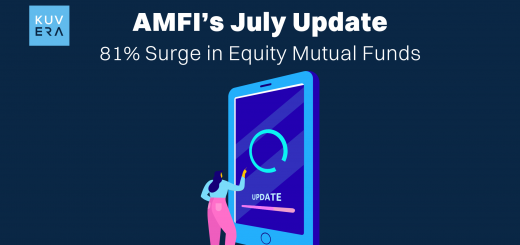Before we understand when to sell mutual funds it is imperative to understand what are mutual funds and what are the benefits of mutual funds.
What Are Mutual Funds?
A mutual fund is a type of investment vehicle that pools investor funds and invests them to produce returns in securities linked to the stock market, such as stocks and bonds. The portfolio of the fund refers to all of its holdings.
Imagine travelling in a Volvo bus, which runs nonstop between Delhi and Jaipur along a predetermined route. Volvo bus has a driver and numerous passengers, just like any other bus. Some passengers board the bus during the trip if the route covers their chosen destination, and some passengers disembark when they reach their destination.
If we apply this to mutual funds, the bus would represent a mutual fund scheme, the destination would be the goal of the fund, the driver would represent the fund management, and the passengers would be the investors’ money. The Volvo bus would go to different locations, occasionally getting caught in traffic. It will occasionally travel on deserted roads, which will allow it to move quickly. The possibility of the tyres being punctured exists as well.
Now, despite everything, the Volvo bus won’t stop. It will keep moving along its course and eventually make it to its destination. The events that the Volvo bus goes through are comparable to stock market volatility. The market will occasionally decline, but it will eventually reach the highway. The Volvo bus is an illustration of a single fund. Similarly, there are several buses that crisscross the country, there are a variety of mutual funds with various goals and travel patterns.
How Are Mutual Funds Organized?
In India, mutual funds have a very distinctive and robust structure. The Securities and Exchange Board of India (SEBI), has established rules and regulations that are followed by all the entities which part of the capital markets. With the intention of safeguarding investor interests, regulating the securities market, and fostering its growth, SEBI was established in 1992. SEBI oversees and governs the operation of mutual funds in relation to them. A mutual fund has a variety of stakeholders, but its fundamental structure is three-tiered. SEBI created this three-tiered framework.
- Sponsor:
The Sponsor, in simple terms is the mutual fund’s promoter. The Sponsor must first contact SEBI if it elects to launch a mutual fund company. Based on the established criteria, SEBI examines and confirms the sponsor’s eligibility.
- Trustees And Trust:
Mutual fund is in form of an entity called a trust. The structure of trust consists of the sponsor(s), trustees, and an asset management firm (AMC). The Trustees act as the investors’ protectors in mutual funds. Their job is to make sure that all the funds are handled in accordance with the stated purpose and that the interests of the investors are safeguarded. They designate an asset management firm (AMC) to oversee the investors’ money.
- Asset Management Company (AMC):
The third significant entity is the Asset Management Company (AMC). The money manager, investment manager, or fund manager is the AMC, and it manages investors’ money in exchange for a fee. The AMC is in charge of managing the daily operations. According to investor needs and market conditions, the AMC introduces new mutual fund schemes to the market and also manages the growth of these funds.
A mutual fund scheme’s draft offer document is submitted to SEBI for review and final approval. The AMC can launch a mutual fund scheme only with SEBI’s authorization. The AMC must operate in accordance with SEBI’s stringent rules, regulations, and guidelines for conducting business in order to uphold integrity and confidence and prevent the exploitation of investor funds. Along with this, the AMC also handles operational tasks for the schemes such as customer care, accounting, marketing, and sales.
Other important entities in the mutual fund sector include:
- Custodian:
Custodians are in charge of managing the mutual fund’s investment account and handling unit and security transfers and deliveries. The responsibility of a third-party custodian is to protect the mutual fund’s assets. Additionally, it keeps track of any corporate activities taken by the businesses the mutual fund has invested in, such as dividends, bonus, and rights declarations. Custodians are also regulated by SEBI.
- Registered Transfer Agent (RTA):
Mutual fund businesses use RTA – Registrar and Transfer Agents (RTA) to assist them in keeping track of all of their transactions. Many administrative activities are carried out by the RTAs, including processing investor applications, creating units when new investments are made, removing units when investors redeem their shares, maintaining an accurate record of investor transactions, processing dividend payouts, etc. The RTA also provides investors with a single point of contact for all information regarding new offers, maturity dates, etc., and handles all mail processing for investors. RTAs must operate under regulations promulgated by SEBI.
- Distributors:
Distributors act as a link between investors and the AMC. The AMC is already involved in fund management and its legal aspects, but they also need someone who can advertise the products, give investors the necessary information, respond to their questions, etc. In order to ensure a seamless transaction between the AMC and the investors, distributors step into the picture and offer their services. The industry’s sales force, the distributor community, is what propels it forward.
- Investor:
All retail investors can now invest with great confidence in mutual funds thanks to the presence of regulating organizations like SEBI and the Association of Mutual Funds in India (AMFI). Any investor can get in touch with the AMC if there is a problem with their mutual fund investment.
- SEBI:
Investors can turn to SEBI to resolve issues if the mutual fund company is unable to address their complaints. To address investor complaints, SEBI has introduced the “SEBI Complaint Redress System” (SCORES).
When To Sell Equity Mutual Funds
Investors in equity mutual funds have been observed frequently attempting to time the market. It basically means that many investors wait for the market to decline in order to acquire mutual funds units at a discount and maximize their profits by selling the units at a premium when the stock market rises. Very often we hear the market advise ‘buy low, sell high’ but this is easier said than done.
Being able to predict the bottom or top of the stock market is impossible due to its inherent volatility. When the market keeps reaching new highs and stock prices are highly valued, some investors may feel tempted to book profits. Nothing wrong with it, however following certain fundamental guidelines can benefit investors.
When selling units or withdrawing from mutual fund investments, one should take the proper steps. There is no optimal timing for mutual fund investors to sell their investments. The idea that you can exit a mutual fund or that there is a favorable time to do so means that you trying to time the market, which is an impossible task to achieve. Timing the market is not a recommended strategy.
Let us analyze a few objective parameters, on the basis of which one can determine if he/she should sell the mutual fund:
- De-Risking:
De-risking, often known as planned withdrawal from equity funds to less volatile liquid funds, it is necessary if your goals are getting closer. Selling equity funds well in advance of the investment horizon would make sense for long-term financial goals like education or retirement. Debt funds can cover the remaining period of your total investment horizon for the targets you’ve set.
- Fund Efficiency:
Regular reviews of your mutual fund scheme’s performance are advised. While some funds may routinely outperform the market or the benchmark, many actively managed funds may do the opposite. If you discover any of those in your portfolio throughout the evaluation process, it might be time to sell them. In some cases, it may be more vital to sell a mutual fund than it was to purchase it in the first place. If the fund performance over a period of time has been deteriorating it is best to exit the mutual fund. This is a crucial phase that, in the ideal scenario, should be carried out with the assistance of a financial advisor through routine portfolio reviews.
- Personal Expenses:
Many investors may choose to exit mutual funds quickly due to their open-ended nature (the majority of mutual funds are open-ended). Selling MF units to cover discretionary expenses is a common practice among investors that should be avoided at all costs. When you have big financial goals on your horizon, you should not deviate from them for smaller discretionary expenses.
- Assess The Risk:
It’s crucial to choose a mutual fund strategy that matches one’s risk tolerance. If your risk appetite is decreasing with time, it will be better for you to switch from equity mutual funds to debt mutual funds.
What To Do In Case The Market Declines?
Many investors sell mutual fund units and even cease SIP when the market declines. As in the past, such dips and corrections might only be short-lived. Staying invested rather than attempting to re-enter when the market turns around is beneficial for long-term investors.
Using a SIP calculator, determine how much money you will need to set aside as an investor to cover the inflation-adjusted cost of your long-term objectives, and then designate funds in that direction. Any short-term market decline could be a chance to strengthen your portfolio. Any brief decline in the value of the stock market can always be taken as a chance to buy, but only if you are sticking to your investment plan. Do not use your contingency fund or other emergency funds in this situation. Your emergency funds should always have enough money to cover your expenses for a year atleast.
How To Redeem/Sell Mutual Funds?
Any of the following techniques may be used to redeem your mutual fund units once the cause for redemption is clear.
- Through Kuvera:
If you have invested in the mutual fund through the zero commission, brokerage-free mutual fund investment platform – Kuvera, you can redeem your mutual fund units in a hassle-free way digitally. All you need to do is to go to your portfolio, select the mutual fund from which you wish to redeem, and thereafter click on the redeem button below the mutual fund name, the Kuvera app will then ask you the amount which you wish to redeem, after confirmation, your redemption process will be initiated and funds will be transferred to your account within 2-3 days (depending on the efficiency of the mutual fund house in whose scheme you have invested).
- Through AMC
You can redeem your mutual fund units through the asset management company’s web portal if you have invested in the mutual fund directly with them. Depending on your needs, you can decide whether to sell some or all of your units. By visiting the AMC office, one can also redeem units offline. You will get the redemption amount by NEFT or a cheque delivered to your address after your request has been fulfilled. The cash is typically credited in a day or two when using the internet approach, which is typically significantly faster.
- Through Demat Or Trading Account
You must redeem your units through the same account that you used to purchase the mutual funds, whether it was a trading account or a Demat account. An electronic payout (NEFT or IMPS) will be provided in response to the redemption request after the procedure is finished. The same bank account that is linked to the Demat account will receive the funds.
- Through A Distributor
Mutual funds purchased from many AMCs can also be redeemed via central systems like CAMS and Karvy. Download a redemption form, fill it out, and deliver it to the CAMS office that is most convenient for you.
Conclusion
It is important to understand that no investor can time the stock market. It is always better to invest in the stock market with a long-term goal. As a long-term investor, you will remain more or less unaffected by stock market fluctuations. However, one should, from time to time, asses the performance of mutual funds in which one has invested and thereafter decide if he/she should continue investing in the same mutual fund or switch to another mutual fund.
Did you know? You can invest in mutual funds through Kuvera:
Step 1: Download the Kuvera app, or visit our website.
Step 2: Create your account on Kuvera by completing the mandatory KYC procedure. This will hardly take a few minutes. Once that’s completed, select the ‘Invest’ option on our homepage, after which you can select ‘Mutual Funds’.
Step 3: Kindly go through the list of all zero-commission direct plans of mutual fund schemes to start investing.
Frequently Asked Questions
-
Do I need to pay tax at the time of selling the mutual funds?
If you have made capital gains on your mutual funds, you required to pay capital gains tax at the time you are filing your income tax return.
-
Do I need to pay tax in case I have incurred a loss on my mutual funds units?
If you have made capital loss on your mutual funds, you are not required to pay any tax on such loss.
Related Blogs: Equity Mutual Funds
Interested in how we think about the markets?
Read more: Zen And The Art Of Investing
Check out all our “Investor Education Originals” videos on Youtube and get smart about investing.
Start investing through a platform that brings goal planning and investing to your fingertips. Visit Kuvera.in to discover Direct Plans and Fixed Deposits and start investing today.
#MutualFundSahiHai #KuveraSabs











